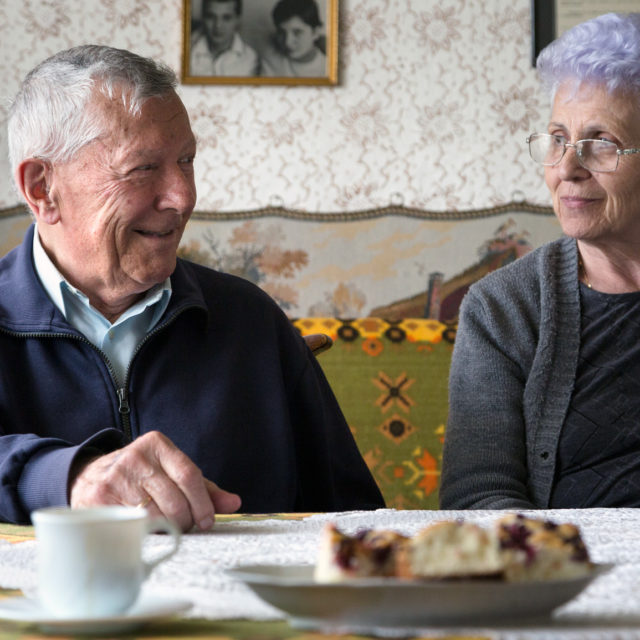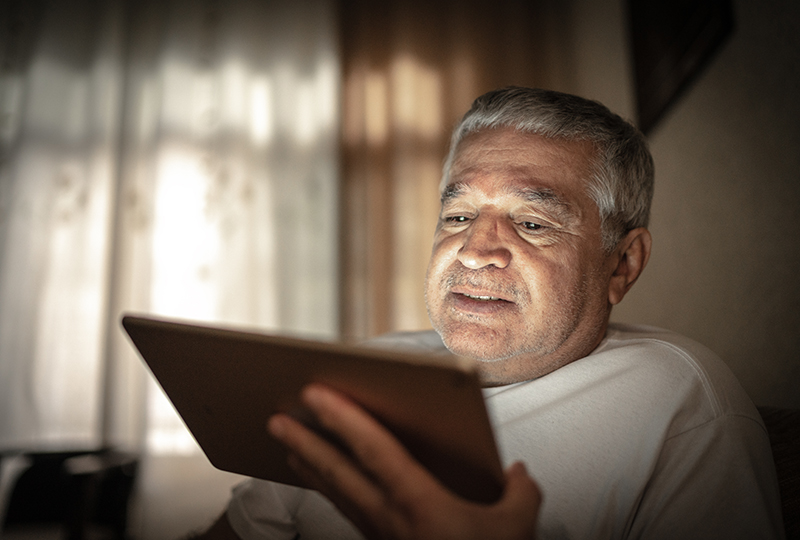Seniors are safest if they continue to stay home. Tips for keeping healthy and fending off the effects of isolation as the economy reopens.
On Oct. 1, 2020, Nashville began Phase Three of the Roadmap for Reopening Nashville. In this phase, more people will be allowed in stores, restaurants and bars than in recent months. There will be larger capacities allowed in event spaces and sporting venues. People are understandably eager to return to work, eating out, shopping in person and attending social events with friends and family.
Public health officials with the city of Nashville and Vanderbilt University Medical Center, however, have cautioned the public that the novel coronavirus, which causes the potentially severe or fatal respiratory illness COVID-19, is still circulating. The virus spreads mostly through droplets people exhale and inhale, and also from surfaces that an infected person touches. Someone else touching the same object, then touching their face, can become infected.
Public health experts offer advice to senior citizens and family members caring for aging relatives about staying healthy as businesses reopen. Their strongest advice: Regardless of the current phase of reopening the economy, seniors are safest staying at home.
“Older adults have a much higher risk of serious illness and death from this virus,” said Grace Smith, Executive Director of the Council on Aging of Middle Tennessee. “If you are an older adult, we ask you to continue staying home as much as possible, and use a mask (if you must run an essential errand) and practice good hand hygiene.”
Of the nearly 300 COVID-related deaths that have occurred in the greater Nashville area, 90% have been among adults over 55 years old — among those 65 and older, it’s 71% — said Alex Jahangir, M.D., a Vanderbilt University Medical Center orthopedic surgeon and Chairman of Metro Nashville’s COVID-19 Task Force.
Public health officials expect Nashville to move through phases of reopening according to how fast the coronavirus continues to spread and how much capacity the local healthcare system has to care for COVID-19 patients, Jahangir said. But until there’s a vaccine for this coronavirus — not likely for another year — the only way to prevent becoming infected is to avoid exposure to it.
How seniors can avoid infection and stay safe as the economy reopens:
- Avoid leaving home except for essential errands. This advice even applies to returning to your place of worship, Jahangir said, though some churches may be reopening with social distancing measures in place. Seniors should ask their faith leaders about how to remain safe during worship, but the best strategy for COVID-19 prevention, Jahangir said, is to “be reverent from home.”
- Have groceries delivered. Some restaurants are reopening their dining rooms, but do not eat at the restaurant. Order food for delivery or curbside pickup.
- Pick up prescriptions from the pharmacy’s drive-through window rather than entering the store, or have them delivered.
- Expect, and request, online appointments rather than in-person visits, for doctor visits and other services such as counseling, home health care and prescription refill orders. Many healthcare providers, including many at VUMC, are holding appointments and refilling prescriptions via telehealth. Ask if an online video appointment is available. The clinic should be able to help you set up the necessary technology on your phone, tablet or computer.
- For seniors who are still working, Jahangir recommends continued working from home, for those whose jobs can be done remotely. For others, talk with your employer about using an office with no other occupants; and/or keeping hours different from others to avoid working physically close to others.
- If you must go out for an essential reason, wear a fabric face mask in public. Businesses are supposed to require employees to wear face masks, too. Know the proper way to wear these masks. The masks help prevent someone who may be infected from breathing the virus onto other people.
- Wash hands frequently, especially after returning home after an errand. Use hand sanitizer frequently if you must go on an essential errand.
Experts acknowledged that staying home brings mental health challenges. Seniors may become socially isolated, especially if they live alone in a rural area. Financial constraints, the death of a spouse and other factors can leave older adults feeling overwhelmed, anxious or depressed. Poor mental health can worsen physical health, said Arie Nettles, Ph.D., director of Vanderbilt’s Office of Inclusion and Health Equity. Depression and anxiety can contribute to problems, including substance abuse, poor sleep and more. Despite which, health practitioners encourage finding ways to practice self-care as a means of escape.
“We are human beings. We thrive on and we need social interaction,” Nettles said.
Technology and creativity can help minimize loneliness. Advice for seniors on combatting the mental health aspects of isolation:
- Make lots of phone calls to loved ones, and ask loved ones to call you frequently. Using the FaceTime feature on iPhones lets both parties see each other.
- Video conferencing, using technology such as Zoom, Skype or Teams, lets you communicate with and see several people at once. These tools work on a computer, laptop, smartphone or tablet. Seniors who have never used these before can ask tech-savvy relatives or friends to teach them how to set them up and use them; so can many of the local agencies serving seniors, listed below.
- Some service agencies (AARP Community Connections and the Commission on Aging and Disability’s Care Through Conversation) can schedule you for regular wellness checks by phone, to be sure you’re well and to offer some friendly conversation. “There are many caring professionals who want to connect with you,” Smith said, even if it’s just to teach you how to order groceries online.
- In-person visits are OK under certain limits. Smith knows someone who holds “back porch visits”– people stop by, without entering each other’s homes. They stay at least 6 feet apart from each other while socializing from the sidewalk, lawn or porch to talk. However, anyone feeling symptoms of COVID-19 (fever, dry cough, body aches, difficulty breathing and/or a loss of sense of taste) should stay home and contact their healthcare provider to determine the best way to treat the illness.
Middle Tennessee organizations and resources help seniors stay physically and mentally healthy. Among them:
- AARP Tennessee
- Council on Aging of Middle Tennessee. Its helpline: 615-353-4235.
- Fifty Forward‘s resource line for Davidson and Williamson counties: 615-743-3416.
- Greater Nashville Regional Council
- United Way of Greater Nashville. Its helpline is 2-1-1, for emergency referrals.
Protect yourself from scams, including those tied to the federal economic stimulus payouts. AARP and the Council on Aging offer tips on identifying and reporting fraud. The Legal Aid Society of Middle Tennessee & the Cumberlands offers financial assistance and free legal help for Tennessee seniors. Reach them by calling 615-244-6610 or 800-238-1443.
Finally, “having an advanced directive … is so very important at this time,” said VUMC geriatrician James Powers, M.D. That’s a legal document that specifies your wishes for your healthcare if you become incapacitated and your family needs to make decisions about your care for you. It’s one of several legal documents that are important for seniors and their families to complete.

The healthcare you need doesn’t have to wait. Your needs didn’t stop for COVID-19. That’s why Vanderbilt Health has restarted surgeries, procedures and clinic visits that were paused or delayed, and we are taking a careful approach to restarting services. Our safety actions follow recommendations from the Centers for Disease Control and Prevention and other trusted experts. How we’re keeping you safe.

